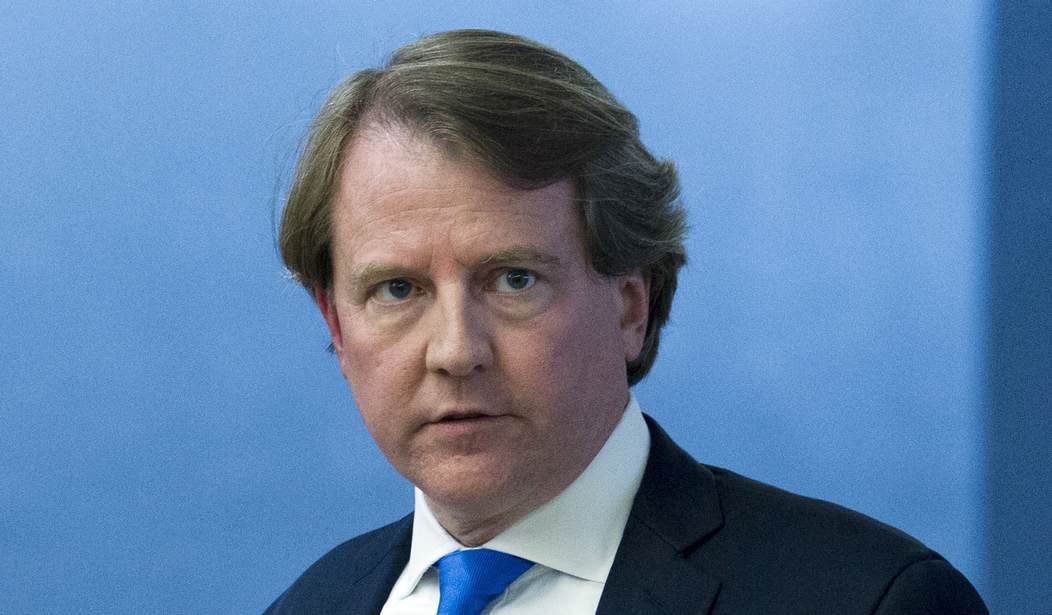It took House Democrats two years to get Donald Trump’s former White House counsel to testify. It took a few hours to realize what a waste of time that effort had been.
After special counsel Robert Mueller declined to pursue obstruction charges against Trump, Jerrold Nadler and other Democrats focused on McGahn’s contribution to Mueller’s report as a potential source for evidence of obstruction. McGahn and the White House resisted that kind of interrogation for as long as Trump was in office, but eventually McGahn agreed to a deal in which he testified in closed session at the House Judiciary Committee. The Associated Press (via the Washington Post) tries to make this sound interesting, but pay attention to the obstruction dog that never barks.
In fact, you have to read all the way down to the fifth paragraph for the one and only mention of obstruction:
McGahn’s hours-long appearance before the committee last Friday, two years in the making and the product of a prolonged court fight, covered many of the episodes at the center of Mueller’s investigation into whether Trump had obstructed justice, the 241-page transcript shows. In the interview, he detailed the president’s agitation at the special counsel’s investigation and various pleas to have McGahn intervene in an effort to control the course of it.
Aaaaaand … that’s it. There was nothing new in McGahn’s testimony that didn’t appear in Mueller’s report two years ago, especially not on obstruction. The fact that Trump was agitated by Mueller had been clear for years before that for anyone who paid attention to Trump’s Twitter account. And asking McGahn to intervene without actually forcing any intervention is what’s typically known as legal advice, not obstruction.
The AP attempts to put the best gloss on this goose egg:
Even if McGahn’s recollections were already well-documented in the Mueller report, and even if he was unlikely to break new ground before the House, Democrats had continued pushing for the lawyer’s testimony to set a clear precedent that executive branch officials must comply with congressional subpoenas. McGahn was one of many Trump administration officials who ignored Congress through the Russia investigations and two impeachments.
Based on this account, it seems as though they might have been smart to ignore Congress, even if not properly following the law. Maybe Jerrold Nadler should have taken the hint.
The biggest revelation from McGahn — stretching the term “revelation” in this case — is that he talked Trump out of serious political trouble by preventing a replay of the Saturday Night Massacre. It had been clear all along that Trump wanted Mueller recused and fired from the special-counsel position, mainly because Trump devoted a lot of his Twitter account at the time with that desire. He came close to firing Rod Rosenstein at one point in order to get Mueller fired, which again everyone knows because Trump was emoting about it all over Twitter at the time.
McGahn told the committee that he didn’t want a replay of the Watergate episode, which seemed likely if McGahn had acquiesced and pressured Rosenstein to act. He refused to call Rosenstein, lest the deputy AG offer a disastrous resignation just as Mueller was finishing up the investigation:
Much of the questioning centered on Trump’s bid to have McGahn get Rosenstein to fire Mueller because of perceived conflicts of interests, and McGahn’s refusal to call Rosenstein. He said he saw the demand as creating a “point of no return” and one that left him feeling “trapped” and contemplating a resignation.
“My fear is, if I called Rod, given the atmospherics, given — you know, I didn’t know Rod well at that point, but what I knew of him, my concern was he could potentially react in a way that would cause him to potentially resign, and that would cause a chain reaction that would be not in anyone’s interest,” McGahn said.
In the end, both Rosenstein and Mueller stuck around. The president didn’t obstruct their investigation, even though Trump would have loved to do so. These are all well-known points within the Russia-collusion investigation, which itself turned out to be a bust.
But hey, they finally got McGahn to recap these well-known episodes for them. Yay.
Aaron Blake concedes that there wasn’t anything new with McGahn’s testimony, calling it “anti-climactic”:
We had to wait a long time to see testimony from former White House counsel Don McGahn. And in the end, it was anti-climactic — at least as far as the known facts went.
McGahn fought a congressional subpoena for two years, ultimately reaching a deal under which he would testify behind closed doors — but only about specific events detailed in the Mueller report. McGahn was a key witness in that probe, having said Trump asked him to get special counsel Robert S. Mueller III removed. (McGahn refused both Trump’s request and a later request for McGahn to falsely deny the request). But the agreement and McGahn’s apparent desire not to make too much news with his testimony conspired to make his testimony far from earth-shattering.
If you read between the lines, though, McGahn’s elaboration on previously known facts doesn’t exactly paint a glowing picture of his former boss.
Well, heaven knows we don’t have enough sources for that kind of depiction of Trump. We only have all the House Democrats, all the Senate Democrats, most of the media, and Trump’s own social-media track record on which to rely. Thank the Lord that McGahn finally showed up to tell us that Trump is “someone who wouldn’t take a hint and move on.”
Actually, that seems to be a common malady these days. Especially at the House Judiciary Committee.








Join the conversation as a VIP Member